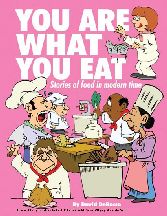Suchen und Finden
UNIT 4: THE SLOW FOOD MOVEMENT (p. 19-20)
When North Americans are hungry, they usually want their hunger satisfied as quickly as possible. That means they don’t want to wait very long to be fed. Thankfully food is plentiful and in most cases easy to access. Fast food restaurant chains exist to give Americans quick access to the foods they like most. Names like McDonald's, Wendy's, Kentucky Fried Chicken, Burger King and other restaurant chains are successful because they serve food fast. The question is this: can fast food be considered good food? To the members of the Slow Food movement, the answer is no! Slow Food is an association founded in 1986 by Italian Carlo Petrini.
Forming Slow Food was Mr. Petrini’s way of voicing his displeasure over the opening of a McDonald's Restaurant in Rome. The main goal of Slow Food is to promote diversity in food and wine culture. Since 1986 the association has grown into a worldwide movement existing in over 50 countries. This movement is committed to protecting cultural traditions related to food, food preparation and the use of wild animal and vegetable species. The 83,000 Slow Food members are also opposed to the way foods are quickly becoming similar in taste, or “standardized,” around the world. Much of this is caused by restaurant chains that serve the same foods prepared the same way across the globe.
The Slow Food movement has some interesting facts to back up their claim. Since 1900, as much as 75 percent of food product diversity has been lost across European nations. In the United States, an incredible 93 percent has been lost over the same time period. The group claims 33 percent of livestock varieties have disappeared or will disappear in the near future. They also claim over 30,000 vegetable varieties were lost in the last century. According to Slow Food, one vegetable variety is lost every six hours! That is not good news for vegetarians who like diversity in their food choices.
To promote their cause Slow Food members organize many different national and international events. These include the world’s largest quality food and wine fair called the Salone del Gusto. It is held every two years in Turin, Italy. The group also holds an annual exhibition in Genoa, Italy called “Slowfish.” It is designed to raise awareness of sustainable fishing methods around the world. One of their most important initiatives was the World Meeting of Food Communities in 2004. The event provided a much needed forum for people around the world who grow, raise, catch and create food in ways that respect the environment and protect the health of consumers.
Despite their love of fast food North Americans are also responding to the Slow Food message. Slow Food U.S.A. is attracting more members who are tired of buying the same things and eating the same foods. This non-profit organization is dedicated to celebrating the food traditions that have emerged in over 200 years of American history. The U.S. group now has over 140 chapters across the country. By reviving the pleasures of the dining table, Slow Food U.S.A. believes that the diverse American food heritage can be saved. Their mission is to guide Americans to better use their taste buds!
Alle Preise verstehen sich inklusive der gesetzlichen MwSt.








